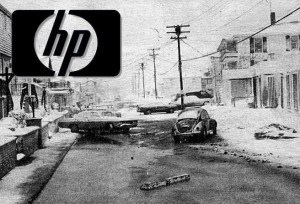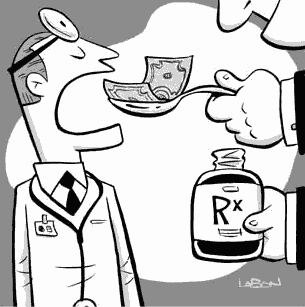
HP's Snowjob: The company that brought you the $70 ink cartridge supports an end to flat rate Internet service to "save" you money.
HP’s Joe Weinman argues consumers are behind the drive to abandon flat rate, “all you can eat” broadband pricing.
Weinman, whose company sells products and services to some of America’s largest broadband providers, has taken up their position that flat-rate Internet service is bad for you, claiming many are paying too much for Internet service they use too little.
In an essay posted on GigaOM, Weinman brings back the all-y0u-can-eat buffet metaphor:
For the record, I like unlimited Internet access just as much as anyone else. However, such plans appear to be on their way out, and here’s why. As I’ve explored in ”The Market for Melons” (PDF), pay-per-use is not an evil plot by greedy robber barons, but a natural outcome of independent, rational consumer choice. Consider a town with an all-you-can-eat (flat rate) buffet and an a la carte (pay-per-use) restaurant. Smart shoppers on diets will save money by patronizing the a la carte restaurant, whereas heavy eaters will save money by visiting the buffet. As patrons switch, the average consumption of the buffet will increase, driving price increases for the luncheon special, causing even more users to switch to pay-per-use.
Bottom line: it is not the proprietors driving this dynamic, but the customers themselves acting out of pure, rational self-interest—light users, by deciding not to subsidize the heavy ones, foster the vitality of the pay-per-use model.
Unfortunately for Weinman, most American broadband customers don’t believe a word of this, and even he was forced to admit as much when he noted consumers “often prefer to overpay for flat-rate rather than save money but risk bill shock.”
Karl Bode at Broadband Reports wasn’t suckered for a moment either, noting:
[…]Cable industry lobbyists would like the public to believe that such a shift isn’t about making more money, it’s about helping the poor. Not only is the metered billing push absolutely about making money, it’s about artificially constricting the pipe to protect uncompetitive carriers and TV revenues from Internet video. But instead, there’s a very concerted effort afoot to portray this shift as necessary, inevitable, and even altruistic.
Most consumers prefer the simplicity of flat rate pricing, and understand that ISPs are perfectly profitable under the flat-rate pricing model. They also understand that this is a pipe dream forged by never-satisfied investors, and once implemented ends with ever soaring per gig fees and ever shrinking usage caps.
Weinman’s essay completely ignores the reality his preferred pricing model already delivers to those who live under it in Canada. Canadian broadband rankings continue to decline as customers there pay higher prices for a lower level of service, with usage caps that actually decline when new competitive threats from online video emerge.
We had to take time out to respond directly to Weinman and his cheerleading friends (see the comments section), some who wrote comments below the piece and couldn’t be bothered to disclose they owe their day jobs to industry-backed dollar-a-holler groups that are committed to delivering on behalf of their provider benefactors:
When Big Telecom comes ringing with promises of savings from metered or capped broadband, hang up immediately.
These plans save almost nobody money and expose dramatic overlimit fees to consumers, creating the kind of bill shock wireless phone users endure.
The OPEC-like Internet price-fixing on offer from big players delivers broadband rationing and sky high prices, while retarding Internet innovations that providers don’t own or control.
Consumers are forced to double check their usage and think twice about everything they do online out of fear of being exposed to huge overlimit fees up to $10 a gigabyte for exceeding an arbitrary limit ranging from 5-250GB.
Americans already pay too much for Internet service and now the providers want more of your money. The rest of the world is moving AWAY from the pricing schemes Weinman would have us embrace. It’s such a serious issue in the South Pacific, the governments of Australia and New Zealand are working to address the problem themselves.
Providers are already earning BILLIONS in profits every quarter from their lucrative broadband businesses. Now the wallet biters are back for more, with the convenient side benefit that limiting consumption is a great way to prevent Internet-delivered TV from causing cord-cutting of cable TV packages.
As far as consumers are concerned, and Weinman admits as much, people are happy with today’s unlimited price models. When Big Telecom complains people are overpaying for broadband, wouldn’t their shareholders be telling them to shut up and take the money? There is more to this story.
Weinman defends the extortion proposition Big Telecom would visit on us: either give us limited use pricing or we’ll raise all of your prices.
But as consumers have already figured out, these providers never reduce prices for anyone. When was the last time your cable bill went down unless you dropped services?
Don’t be a sucker to Big Telecom’s “broadband shortage” or pricing myths. Broadband is not comparable to water, gas, or electric. The closest comparison (and the one they always leave out) is to telephone service, and as we’ve seen, that business is increasingly moving TOWARDS flat race, unlimited pricing.
Want to know what metered pricing does to the wallets of consumers? Just ask Time Warner Cable customers in Rochester, Greensboro, San Antonio, and Austin what they thought about the cable company’s “innovative” pricing experiment that tripled the price for the same level of broadband customers used to get for $50 a month. After the torches and pitchforks were raised over $150 a month broadband service, Time Warner backed down.
Either with or without metered pricing, the cable company raised its prices three times last year alone.
The industry’s meme that “usage-based pricing” in inevitable is only true if consumers allow it to happen. The parade of Internet Overcharging advocates all share one thing in common — they earn a living from the providers that dream about these pricing schemes. Always follow the money. As we’ve exposed repeatedly, the vast majority of defenders of these kinds of pricing schemes are not consumers. They are:
- The providers themselves;
- Wall Street banks, investors, and the business media catering to them;
- Non-profit groups receiving substantial contributions from providers;
- Industry-funded “think tanks” and research that can carry the industry’s public policy agenda, hoping the media that quotes them are too lazy to follow the money;
- Equipment and service vendors, unions, and other groups who depend on the business or jobs they get from providers.


 Subscribe
Subscribe

Talk about a vicious liar. He can go F***K himself.
Does he really believe his own nonsense?
I’m not sure that it is complete nonsense. Not for everyone anyway. My take on this, from a business perspective:
http://eject3ject.wordpress.com/2010/12/14/pay-per-drink-pricing-an-enterprise-perspective/
I would not have a problem with capped based plans if they added cap based plans that saved the low usage users money. The problem with that is they are not. All they want to do is regulate how much all users use.
They do not want people to save money. This subsidy stuff is utter nonsense. There is no reason that they could not have a plan that cost $25 that gave 50Gb a month for the people who use less than that along with their current plan of unlimited at double that.
Another guy that thinks nobody ever needs to watch a video or listen to audio for any reason
Low income users have always had affordable options in the $10-25/mo month UNLIMITED internet plans via dialup, DSL, and Cable. The problem being many companies like AT&T refuse to advertise them anywhere unless you actually try calling and asking. There’s also government programs that can further reduce the cost or make them free. The change to a cap and metered plan in order to “save” low income users doesn’t save them money at all, It’s a exploitive system of overcharging that preys on the users inability to carefully manage bandwidth use while basicly giving them a loaded gun with high-speed… Read more »
He might have a point. But for us over eaters, we are even offered the buffet anymore. I’m not on a diet, why do I have to choose from the Dieters Menu?